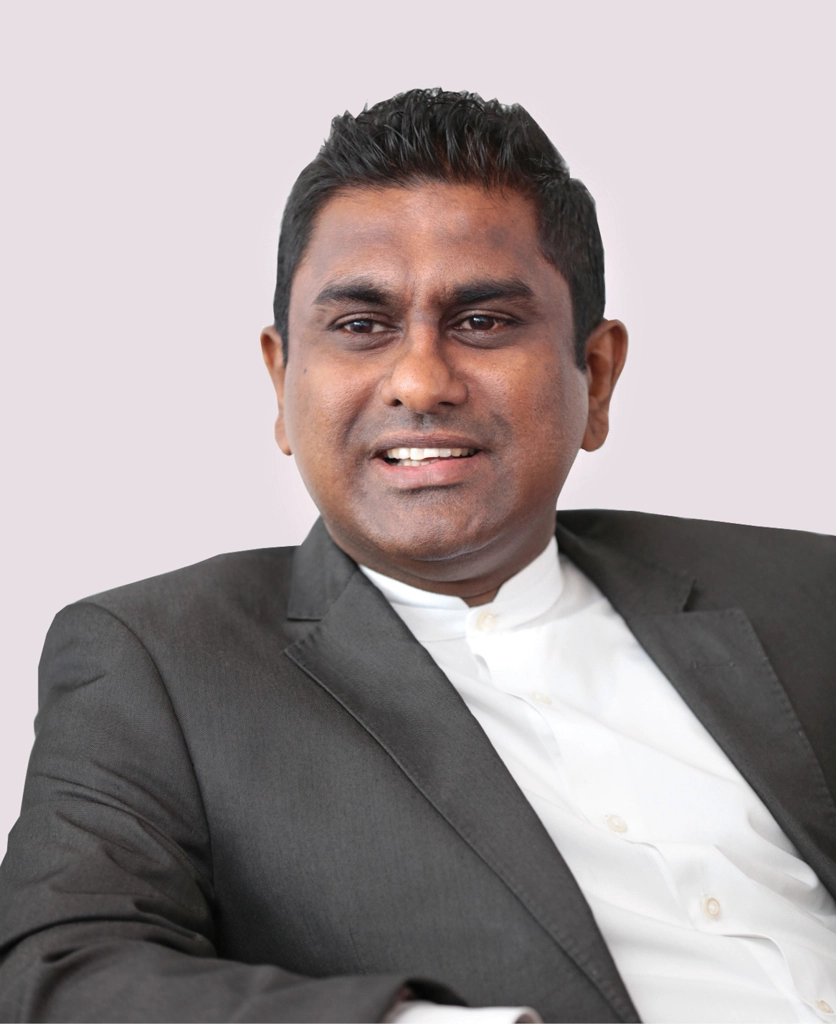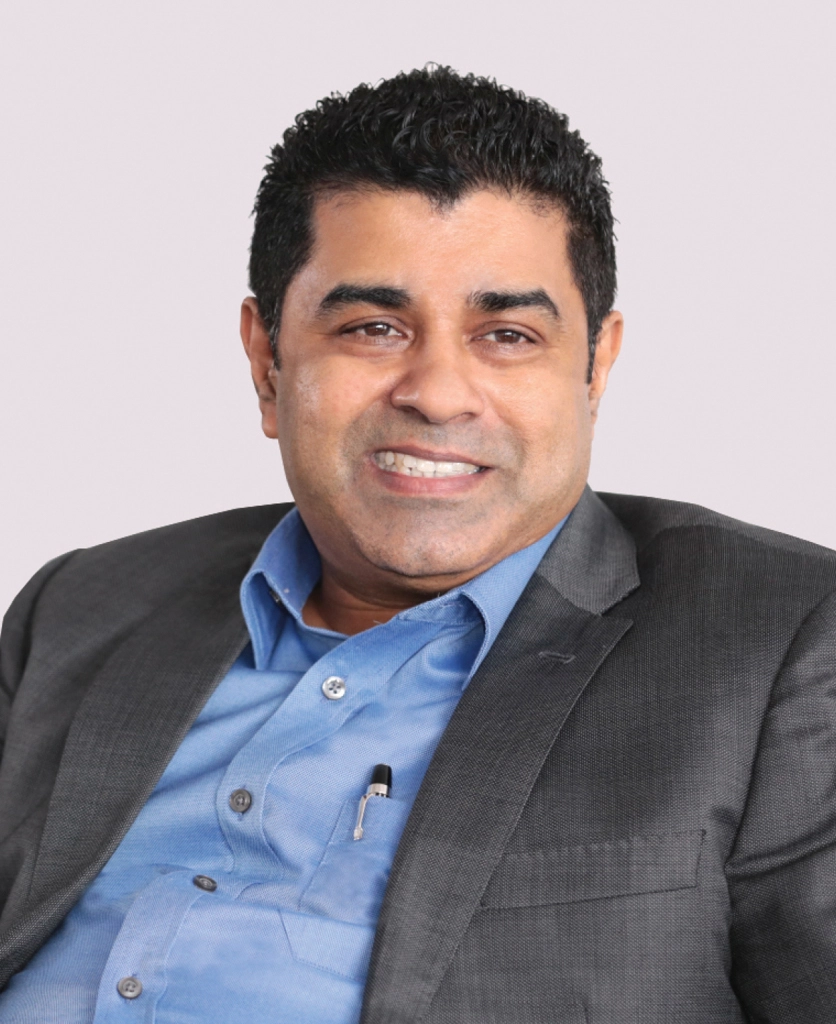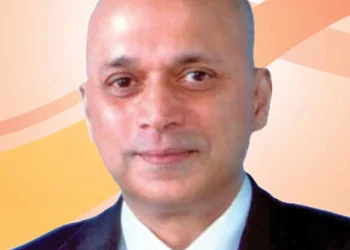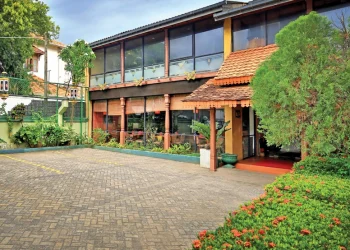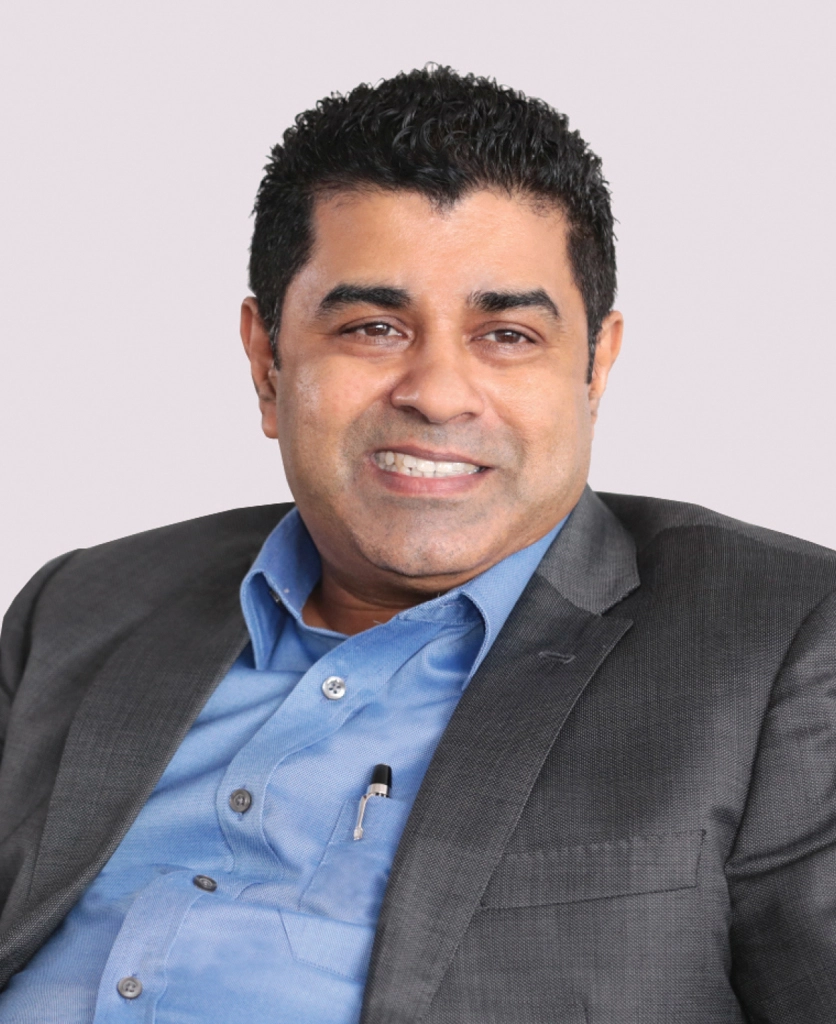
Epic Technology Group has been a trailblazer in the FinTech and Enterprise Digitalisation sectors of Sri Lanka and the region. From a humble beginning, the company has grown through the years, while offering innovative and world-class technology solutions to enhance the operational efficiency of customers from diverse industries. Commemorating the milestone of 20 years, the company is looking at a bigger and brighter future. Dr Nayana Dehigama, Executive Chairman/Managing Director and Viraj Mudalige, Group Director/CEO of Epic have all confidence in Sri Lankan talent and the scope within the industry. While strategically building their presence in Asia, the company’s focus is to go global.
By Keshini de Silva. Assisted by Swetha Rathnajothiee
Photography Menaka Aravinda
Could you tell us about Epic Technology, the company’s 20-year journey and the recent performance?
Dr Nayana Dehigama (ND): Epic was founded in 1998 as a backyard company. When I founded this company I invited three colleagues from my previous place of employment to join me establish the business, especially with their technical expertise. We started the company as a Value Added Reseller (VAR) of the US based payment solutions giant – VeriFone Incorporation, and offered secure payment solutions to the Financial Services Industry (FSI). Soon, we joined forces with Gemplus Corporation, a French company who was the then market leader in the Smart Cards industry. Gemplus appointed Epic as an ‘expert network member’ in the payment related business sector, which was a great achievement for a start-up company.
Though we started our operations as a VAR, from the beginning our vision and ambition was to become a technology leader in the secure payment industry. Therefore, while selling EDC/POS machines to banks, we assimilated knowledge and skills through our technology partners to develop secure payment applications. We also widened our knowledge base with complementing core competencies such as transaction switching, information systems security and mobile applications in order to expand our offerings in the FSI market. Thanks to the highly talented team we built and strategically focused business development thrust, we managed to establish ourselves as the market leader in the secure payment domain by 2001 with a few flagship projects being implemented in large banks in Sri Lanka.
Though We Started Our Operations As A VAR, From The Beginning Our Vision And Ambition Was To Become A Technology Leader In The Secure Payment Industry.
By 2002, the company decided to diversify its business into a few promising verticals. However, our strategy was to adopt an organic expansion by adding competencies that are complementary to the secure payment industry. As such, we acquired expertise in information systems and transaction security, mobile applications as well as process digitalisation. These competencies helped us to create technology solutions for totally new verticals such as e-Governance, Document and Workflow Management, Enterprise Digitalisation and PKI Infrastructure. As of today, Epic dominates in five verticals even though 60 per cent of the company’s revenue is generated from the secure payment vertical. Epic is a leader in the industry today, with well over 90 per cent market share in EDC/POS and Mobile Banking Solutions in Sri Lanka. Epic also was instrumental in developing and introducing the first-ever eWallet solution in Sri Lanka, which has now become an internationally acclaimed flagship product.
Started as a backyard start-up with just four members on board, Epic has today grown to be a regional player with many success stories to its credit. The company is operated with a team of over 300 technocrats and experts in its own 40,000 square feet facility.
Epic Is A Leader In The Industry Today, With Well Over 90 Per Cent Market Share In EDC/POS And Mobile Banking Solutions In Sri Lanka. Epic Also Was Instrumental In Developing And Introducing The First-Ever EWallet Solution In Sri Lanka.
In addition to developing and implementing world-class software solutions, Epic is responsible for supplying the Sri Lankan Passport since 2003, new Polycarbonate National e-NIC (National ID Card) and all four denominations of Circulation Coins for Sri Lanka.
As a provider of Secure Payment and Digitalisation Solutions, what are the products and solutions you offer? Will there be any new products?
ND: The payments were becoming digitised seamlessly over the past years in Sri Lanka as well as in the region. Earlier, people used to go to the bank for banking transactions, but with rapid digital transformation customers are demanding convenience and mobility at large. Therefore, banking and payment services are now being offered by using the technology where enormous advantages and convenience could be derived for both the customers and service providers. Financial inclusion has been promoted in the country as well. The payment industry has been growing, transforming and the FinTech industry has emerged in Sri Lanka.
Banks in Sri Lanka, especially the larger banks, were traditionally competing in a small space; especially in urban markets with limited credit worthy customers. As the competition became fierce especially from the new, young and techno-oriented banks that offered more flexible and innovative products, banks had to find and reach newer markets for survival and growth. The solution was to go beyond traditional boundaries and reach and develop different markets, especially in the rural un-banked segments. Unfortunately, these bottom-of-the pyramid market customers were scattered over a large geography and produced small-value transactions, thus reaching and getting them engaged in business was a great challenge. One option banks had was to open branches; however, this was quite costly and not feasible. The next option was to use technology to reach new customers spread in a larger geography to promote inclusion. Luckily for us, the banks chose the second option and we were there at the right time. Thanks to our ‘visioning’ and ‘futuring’ strategy, we were ready to offer financial inclusion solutions using cost-effective technology even before the banks had made that decision.
We Introduced The Branchless Banking Solution In 2005, Together With A Global Bank That Was Operating In Sri Lanka…In 2008, We Brought Recognition To The Country By Establishing Ourselves As The Number One In Asia Pacific For The Branchless Solution. This Became The First Turning Point In Our Journey.
In fact, we brought the concept of Branchless Banking to the world. Until we innovated technology using a simple conventional EDC/POS machine to simulate on-line real-time transactions to offer banking products that were otherwise offered only in bank branches. This innovation allowed banks to carry out bank branch operations without having invested in bank branches. This was almost 15 years ago and banks in Sri Lanka at that time could not believe it. We even went to other countries such as Bangladesh, Indonesia and Malaysia and started promoting this concept. We implemented our first-ever Branchless Banking product in Sri Lanka through HSBC Sri Lanka Operations, in which we transformed over 750 Post Offices to work as HSBC branches, helping the bank to establish its global strategy to become the ‘world’s local bank’ in Sri Lanka. From there onwards, the concept spread all over the region, and a few competitors too started to develop based on the concept we introduced. We are proud to say that the largest Branchless Banking rollout in Malaysia has been done by Epic. The concept evolved over the years and adopted latest technology advancements. Now we use tabs, mobile phones and various other digital devices to simulate on-line branchless banking transactions, anywhere without a branch.
In the 2000s, information security became a concern as the world and devices started interconnecting and online banking and e-Commerce emerged. People started exchanging information online. Then security, authenticity, integrity, privacy, accountability and user management become a serious concern for all electronic online transactions. This is where we decided to bring in information security solutions and we realised that it is necessary not only for payments, but also for the entire connected world. Sri Lanka’s Terminal Line Encryption for all credit and debit card transactions have been developed and implemented by our team headed by Viraj. We did a national-wide role out under the guidance of the Central Bank of Sri Lanka. Transaction data that flows between EDC/POS Terminals and the banks backend hosts are fully encrypted and secured using our solution. We first implemented it in the banking and financial sector, and that knowledge we have brought in to other applications such as e-Governance and Enterprise Digitalisation too.
Viraj Mudalige (VM): When we started in 1998, it was an era where there was a move from manual to electronic, the 90s were all about automation. Today, 20 years later we are talking about digitalisation. Although we started the company as a value added reseller for POS devices, we were passionate to bring in solutions and I myself was passionate about payment solution architecture. We wanted to move away from being a device seller to a solutions company and as of today, we have realised that goal.
20 Years On, Epic Is No Longer A Follower, We Are A Leader In The Industry, Second To None And Ready To Compete With Any Leading International Brand. Our Achievements We Believe Are Also A Source Of Pride For The Nation.
In 2000, we introduced the Branchless Banking concept. No one was talking about branchless banking or agent banking at that time. We introduced the Branchless Banking solution in 2005, together with a global bank that was operating in Sri Lanka. Then in 2007, we were recognised for offering Sri Lanka’s best novel concept and unique solution of branchless banking. In 2008, we brought recognition to the country by establishing ourselves as the number one in Asia Pacific for the branchless solution. This became the first turning point in our journey which enabled us to start working towards international expansion.
Soon after, we were able to gain a foothold in Malaysia after we opened our first international office. We received MSC status and were also able to penetrate the Malaysian market rapidly, almost in no time after opening our doors in the country. Since then, we have tied up with the largest bank in Malaysia to implement our award winning agent banking solution and have been able to deliver national level solutions to the country.
Another groundbreaking advancement that propelled the company forward was our architecting of the Terminal Line Encryption solution for the country. Between 2006 and 2012, tourists were concerned about using their credit and debit cards in Sri Lanka, due to the high risk of fraud. We introduced Terminal Line Encryption, which essentially protects credit card information during transmission. It was a project at the national level for which all Sri Lankan banks tied up with. I am happy to say that since we introduced this solution in 2012, it has helped Sri Lanka significantly reduce the number of credit card frauds, thus enabling convenience and building confidence in the market.
We were also the first to introduce the single wallet for payer and payee in Asia, when we created a solution together with the Bank of Maldives in 2015. Later in 2016 we introduced the only homegrown 3D secure access control solution to ensure customer authenticity during a card not present transaction. And we are one of the few global vendors of this solution that have been fully certified by the largest card associations namely Visa, Mastercard and American Express. Our latest achievement that we are truly proud of is the deployment of Sri Lanka’s only fully fledged Card Management System including comprehensive issuing, acquiring, reconciliation and automated disputed resolution.
When you enter international markets, do you tailor and develop products to suit those markets and regulations?
VM: Every economy has its own regulations and the financial sector in general is a more highly regulated domain than others. Thus, our solutions would need to be tailored to suit the rules and regulations stipulated by the Central Bank of that operating environment, while also adhering to the operational guidelines of card associations such as Visa, Mastercard, American Express and Union Pay. In addition, there are independent bodies such as the PCI, PADSS and EMVCo, which specify additionally security as well as data handling specifications to ensure the integrity and authenticity of payment related transactions.
We need to have a good concept, however there are regulations that we must adhere to even in disruptive and innovative business environments. Therefore, once we develop solutions, we analyse all respective Central Bank rules and regulations. For example, when we introduced the Branchless Banking Solutions or the Terminal Line Encryption Solution, we adhered to the guidelines from the Central Bank of respective countries as we have to be compliant with that market.
The technology industry is changing at a rapid pace. How do you keep up with the latest trends?
ND: Rapid and continuous change in technology is the biggest challenge technology companies face. It is changing at a pace where you and I cannot even fathom. We make every effort to keep pace with and adopt new changes. But we do not adopt every change that emerges because it is not practical. Therefore, we generally start from the market point of view, to identify what is needed and what gaps exist in the market, and then optimise best available technologies to suit this.
At the moment, the trend in payment solutions is Cryptocurrency and Blockchain. These are the latest buzz words spoken in the technology world. Though we are leaders in the payment industry having our own innovations, we cannot forget about these new trends. Whether that will be a disruptor in the market or not, we have to adopt it and learn what it is. We need to understand and integrate those technologies into our existing products or create new products to see how it can offer advancement to our customers. Later the market will decide whether it is only a hype or an innovative disruption in the industry. Therefore, we have appointed a special team to learn about Cryptocurrency and Blockchain as even Central Banks in the world are seriously discussing on how they should adapt to these new trends.
Even Though Fierce Competition Is Getting Stronger By The Day, It Creates Great Potential For Innovative And Disruptive FinTech Solutions.
VM: At the time we started, we wanted to bring domain expertise to Sri Lanka. When I was working for an international giant to introduce the first credit card to the country, I realised how much of money is exiting the country, because we did not have the required domain expertise. Domain expertise is crucial, and countries especially the European nations dominated in terms of industry-specific expertise at that time. Therefore, our dream was to break away from the mindset in terms of merely being coding experts and to inculcate a culture with payment domain expertise; if not, Sri Lankan software engineers would merely develop software according to concepts architected in other countries.
We are passionate and also focus on the domain of payments, and we are yet to see any strong Sri Lankan software brands creating solutions for industries such as healthcare and hospitality. Since 1998, we slowly gathered domain expertise in the field while enhancing our technological expertise, and launched payment solutions or FinTech solutions for Sri Lanka and now the Asian region. 20 years on, Epic is no longer a follower, we are a leader in the industry, second to none and ready to compete with any leading international brand. Our achievements we believe are also a source of pride for the nation.
Since we inculcate domain expertise, university graduates want to join Epic so that they can receive training and exposure to this highly specialised and niche vertical. There is a huge demand for our interns and employees, especially from overseas, and you see many of them employed in the ASEAN region due to their highly specialised skill set and the strong engineering rigor that they have been exposed to while at Epic.
What about Research and Development?
ND: We have a separate R&D company called Epic Research and Innovations (ERI). What we basically do there is, utilise existing technologies in the world, integrate them to create innovative solutions to address niche needs or gaps in the market. They try to find out how to solve social problems using technology. One of the products they have innovated is a Flood Prediction and Forecasting System, because flash floods are a huge issue in Sri Lanka, which cause a devastating loss of life and damage to assets. We came up with the algorithm together with the International Water Management Institute (IWMI) to predict, with about 80 per cent accuracy, probable areas that will be affected by the floods within different hours. Our solution will then alert the people around those vulnerable areas advising them to take necessary precautions in order to mitigate losses. Even though we are a technology expert, we needed domain expertise to make our solution effective, and that is why we joined hands with an institution like the IWMI to obtain industry specific knowledge and advice. We have introduced many similar solutions through ERI to benefit society. However, we also have different research teams working on specific mainstream products, and they directly report to product owners.
VM: We do research and development to also ensure that we do not absorb new trends in an isolated manner. In terms of Blockchain and Cryptocurrency we want to enhance our own solutions to increase their value proposition and not merely flood the market with new products. We have an in-house, dedicated research team to perform all R&D activities and since 1998 we made a conscious decision to allocate ten per cent of profit towards this pursuit. Furthermore, we continuously and actively engage with universities, industry specialists and related consultants to ensure that we remain at the very cutting-edge of the electronic payment domain.
With the emergence of international competition, what is the scope for Sri Lankan companies in the e-payment industry?
ND: Electronic Secure Payments are ever growing especially in this era of digital transformation. As you can see, over 90 per cent of the banks operated in Sri Lanka offer electronic channels to do online banking especially via mobile platforms. Even though fierce competition is getting stronger by the day, it creates great potential for innovative and disruptive FinTech Solutions in the market. Sustainability of current technology offerings is quite uncertain with the amount of disruption taking place in every industry. Therefore, today’s best technology may become obsolete tomorrow creating newer opportunities for companies like us. The FinTech domain is definitely a growth industry, and thus will offer adequate space for many more players to survive and grow.
VM: FinTech is part of everyone’s day to day lives. Unlike any other industry, the functions of making payments must be secure, convenient and deliver high user experience. In Sri Lanka, the industry is dynamic and growing very fast, and we are constantly discussing innovation. At Epic we are positive and although we think and aim big, we execute prudently at a steady rate in alignment with the country’s progress.
The Reason For Our Capacity To Disrupt And Innovate Is The Incredible Talent Pool That Is Available In Sri Lanka. Thanks To The High Standard Of Our Free Education, Sri Lankan Graduates Are Capable Of Delivering Engineering Marvels.
For example, nearly one million credit cards and seven to eight million debit cards have been issued in Sri Lanka, however there are limited places at which these cards can be used to make purchases. Although there are 450,000 merchants in the country, we understand that less than ten per cent are geared and capable enough to accept electronic payments. We started offering viable solutions to banks and financial institutions to capture and tap into previously unreachable markets at lower costs. Being a local company, we fully understand the pain-points experienced by our banking and financial institutes when dealing within the Sri Lankan landscape. Hence, we believe that this knowledge gives us a home advantage over other international players who may not be able to understand the Sri Lankan mindset.
How are you strategising to compete with larger global e-solutions providers?
ND: We fully understand the competition and challenges we have to face in our voyage towards globalisation. Therefore, we have adopted continuous innovation and domain specialisation as our main strategy to counter threats. Our strategy is systematic, clear, strong and well communicated to all stakeholders at Epic. We have also changed our company structure to support strategy. Assimilation and creation of domain knowledge through co-operation with customers and technology partners while building core and distinct competencies that are necessary to compete with big international players have also become part of our strategy. Co-creation; which is getting our clients involved in designing and developing customer-specific solutions is another strategy that has worked well for us in the past years. We also offer a great value proposition for our customers, which is very difficult to counter by our competitors.
VM: We are very proud to say as a Sri Lankan company we are second to none. This is due to our continuous innovation and value addition. For example, our card management system is a single platform that can work with any major card association while acquiring transactions via traditional channels such as ATM and POS as well as novel channels such as QR code. A point to highlight is that the reason for our capacity to disrupt and innovate is the incredible talent pool that is available in Sri Lanka. Thanks to the high standard of our free education, Sri Lankan graduates are capable of delivering engineering marvels that are second to none anywhere in the world. This national asset is one of the key advantages we have when we compete in the international arena.
What more needs to be done in Sri Lanka, in terms of technology?
ND: I do not see many boundaries in the country in terms of adopting technologies. Even if you go to the most rural areas, people are using mobiles and technologies. Because of our small geographical size, anything can be implemented quickly and it goes through to the grassroots level with the exception of maybe a few distant villages.
However, I feel that there must be a better, frequent and active dialogue between the industry and academia, which is yet to happen to a sufficient extent. This is a big gap today. For example, even though there are many technology universities and academic institutions that teach technology in Sri Lanka, the question still lies whether these institutions produce the right technocrats ready to be used and absorbed by the industry. Most of them are not trained for the industry.
Though We Had Our Own Roles To Play, It Was Almost A Flat Organisation As Everyone Was Taking Responsibility For Their Roles.
Universities send their final year students as interns to the industry, but it is only for a period of around six months. The only objective of these graduates is to obtain a certificate on the completion of the internship, as it is a requirement to complete their degrees. I feel that these students should spend at least 70 per cent of their time working hands-on in the industry while learning on-the-job. Attending classroom courses could be done during weekends or after working hours. In this manner, I feel, they can be transformed to be an industry expert by the time they complete their degrees.
The issue today is that these students mainly focus on learning classroom basics when in fact the industry requires domain experts.
VM: In Sri Lanka communication is advanced, when compared to the region. Anyone can access the network and we have been the first to offer 3G and 4G in the region. However, we need to inculcate habits, especially amongst the younger generation and in schools, to use these facilities in more effective and efficient manner. Whether you are in Colombo, Anuradhapura or Tokyo, you have access to the same information.
As a country, we should provide opportunities for companies innovating new ideas and concepts. This will encourage the use of locally built products, services and technologies. The country needs to also help companies such as ourselves to present Sri Lankan brands overseas, and the Government must help promote Sri Lanka as a country overseas. Promotion is not merely for the benefit of Epic, but for our entire workforce and country. At a national policy level, the Government needs to implement forward thinking legislature that will nurture and promote the adoption of new technologies, for example the ability for a universal digital payment platform that can enable citizens to pay via any instrument to any merchant electronically.
What are your thoughts on the talent and skills in terms of technology in Sri Lanka?
ND: Sri Lanka is one of the best locations for talent. I have experience across the globe, however I have never seen talents such as what we see in Sri Lanka. All the products and solutions that we offer at EPIC, which are undoubtedly world class, are created by Sri Lankan talent. They are not second to any internationally available software product or solution, and sometimes we are even better. That is the main reason we win international contracts continuously. Currently, we are developing a core-banking solution for Singapore Police Corporative Society, and we competed with companies from Singapore and India to obtain that project.
Another issue, I must mention is that we do not have enough numbers to recruit. It is somewhat scarce to recruit good talents, as the supply is not meeting the demand of the industry. There is a tendency for our talents to be drained by western countries that offer lucrative packages, which cannot be met by local companies. Because of this, we also tend to lose the best talents of Sri Lanka.
VM: I have a high confidence in Sri Lankan talent and skill, especially research and development. The utilisation of this skill set is limited due to limited domain expertise. Thus it is our obligation to provide the necessary expertise in any area of industry, which will add value to the individual. Generally, there is a very high-demand in the region for Sri Lankan talent due to their intellectual prowess and strong work ethic.
Operational culture at Epic? Your thoughts on staff retention in a sector where there is high mobility?
ND: When I founded Epic, I wanted to make it a family and I still want to stick to that policy. We never called them employees. We always called them family members. That was the culture that I created. Though we had our own roles to play, it was almost a flat organisation as everyone was taking responsibility for their roles. However, as the company grew, I saw that the family culture was becoming impractical. I can see that the new generation has become more introverted and do not have the feeling of togetherness and family. It is probably because of the culture and background in which they grow up. We grew up differently and had strong inter-personal relationships with our neighbours and friends, however most of the children today do not have that opportunity.
Over the years, we felt the change in the attitude of the new comers where they were fantastic in terms of technical knowledge and delivery, however they were only focused on that and nothing much beyond. This is a common problem in the industry. Our attrition rate is about 25 percent. Imagine the cost of re-recruitment. We take many months to train the employees we hire to make them ready for production. However, when they are ready to deliver, they try to leave the company due to no fault of ours. This means the company must go through the same cycle of recruitment and training once again. In addition, we have to utilise more time of the executives to conduct interviews, train them and orient them to the company culture. It is a critical problem the industry is facing.
We used to have a policy of relaxed working times and expected bottom line achievement and delivery. However, over the past years we have found that this flexibility is being misused, and as a result we were compelled to introduce different disciplines and work ethics for all employees.
VM: It is all about team spirit. We have always believed in the family culture and environment and seek to take care of staff. We always look towards the long term employment of our staff. Although retention is difficult in the industry context, I am happy to note that our key people have been working with Epic for the past 20 years. This is because we take good care of them. We have a pool of passionate individuals that drive the innovation as well as creativity, which helps Epic to deliver world-class solutions in the FinTech Solutions arena.
Could you tell us about yourselves?
ND: I am a very humble man. I call myself an entrepreneur. I am a product of Kingswood College, Kandy.
I started my entrepreneurial pursuits while I was studying for my Advanced Levels. From there onwards, I attempted on various occasions over 15 years to find success in entrepreneurial initiatives. I failed in seven attempts and each time I failed I joined a company to recuperate and then my entrepreneurial spirit would push in. I tried my luck for 15 years until I founded Epic in 1998.
I studied for Electronics Engineering qualifications from the Engineering Council of London as well as City & Guilds of London. I also completed my Postgraduate Diploma and an MBA at the Postgraduate Institute of Management and the University of Sri Jayewardenepura. In 2015, I completed my Doctoral Degree with a perfect average at the Asian Institute of Technology, Thailand. As a self-made entrepreneur I have a lot of experience and many stories to share with. My wife Dinu is the strength of my life. I have two children – daughter Nethmie and son Nethum.
VM: I hail from the South of Sri Lanka and my alma mater is Richmond College, Galle. I was passionate about technology even when I was at school, and received two scholarships and therefore received international exposure from an early age. I was also passionate about photography, and I myself created a dark room in our school to develop photographs taken at our school events. Thus, I had the entrepreneurial spirit from a young age and cultivated my leadership skills at school.
I went on to study electrical engineering. Fortunately, or unfortunately, I was selected by a global company to introduce the first credit card system in Sri Lanka. It was different to what I had studied, but it was a new era and new things could be achieved. Therefore, I did take a risk amidst concerns from my colleagues as well, but it worked out for the better. Subsequently, I did my chartered in electronics and communications and then completed my MBA and MSc.
As Chief Executive of Epic I look into the overall drive of our payment solutions including knowledge sharing with customers, solution architecting and evolving the solution suite to reach the next stage. My wife is Buddhi and I have two children, a son and a daughter.
At the juncture of 20 years, what are the future plans for Epic Technologies?
ND: Go global. That is our main aim. I am ready to do whatever it takes in order to take Epic global. It may mean restructuring the company, acquisition, inviting new investors or getting partners. The main objective will be to make Epic a sustainable global technology leader.
We Have Been Working Towards Pushing Epic To Become A Global Company And Our Vision From The Onset Is To Create One Payment Platform That Replaces All Banking Functions.
I know the capabilities and strength of our team of technocrats, most of them are headed by Viraj. I believe that as we have the opportunity, knowledge as well as power, it would be a mistake if we do not leverage on these to make Epic a global company. I am not worried about the operational aspects as we have an able team headed by fantastic and able managers. It is my prerogative to formulate our vision of going global and pave the way for Epic to go there as a united family.
Epic celebrates 20 years this year. Though it is a substantial journey, this is only a small milestone in terms of how far we want to go. We envisage a long future for Epic. We are happy about our achievements over the years, especially in terms of realising our goals. We have recorded profits every single year, except in 2001, mainly due to the downturn in the Sri Lankan economy. As you know, for the first time in the island’s history the country recorded a negative GDP growth of 1.5 per cent. We have been extremely successful over the two decades, realising all our goals and dreams.
Therefore, I need to recognise the superb members of the Epic team, especially Viraj, my partner who did a wonderful job in developing the payment business segment, the engineers and the technical staff, and every other team member who tirelessly contributed towards the success of Epic. They are the strength, spirit and foundation of this organisation.
I must also mention our customers, who believed in us. Because of the creditability we had as a team, our customers were generous enough to listen to us and gave us a chance to prove ourselves as a start-up. That was our breakthrough. We live for our customers and our passion is to make our customers delighted.
VM: We have been working towards pushing Epic to become a global company and our vision from the onset is to create one payment platform that replaces all banking functions such as ATMs, POS and internet banking that are presently isolated systems. We hope to be the first FinTech company in the world to unify all of these payment channels into a single platform. That is our dream.
I would like to say a big thank you to our local and international customers, especially our Sri Lankan customers. We did everything from scratch, we did not have huge references, and therefore all our customers took a huge risk to select Epic for their FinTech solutions 20 years ago. Banking is a risky business, and our international competitors at the time had over 100 references, which we did not have. In celebrating 20 years, I need to show my gratitude to our customers for trusting us, a Sri Lankan company, and for assisting us in our journey to go global.
At the same time, I give equal respect to all our employees who have worked with us past and present. Epic is a family, and as a family we have reached this milestone and we will continue to work together to take this company to the next level.
